Professionalism in Nursing
VerifiedAdded on 2023/01/16
|12
|2992
|53
AI Summary
This article discusses the concept of professionalism in nursing and explores potential transgressions that can occur. It focuses on the Australian registered nurse standards and the consequences of unprofessional behavior. The cases of a nurse coming to work with hangovers and a nurse violating patient privacy are examined.
Contribute Materials
Your contribution can guide someone’s learning journey. Share your
documents today.
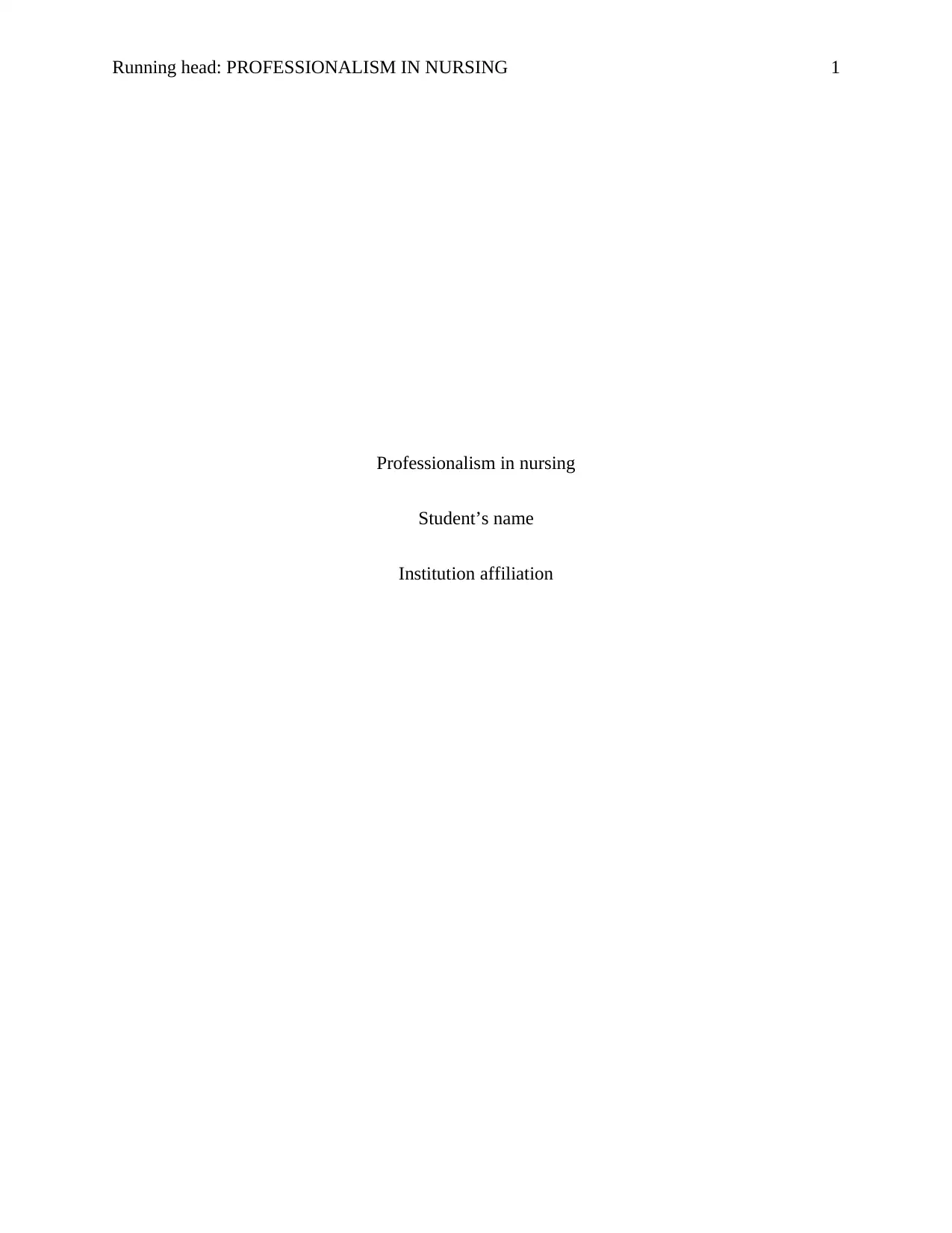
Running head: PROFESSIONALISM IN NURSING 1
Professionalism in nursing
Student’s name
Institution affiliation
Professionalism in nursing
Student’s name
Institution affiliation
Secure Best Marks with AI Grader
Need help grading? Try our AI Grader for instant feedback on your assignments.
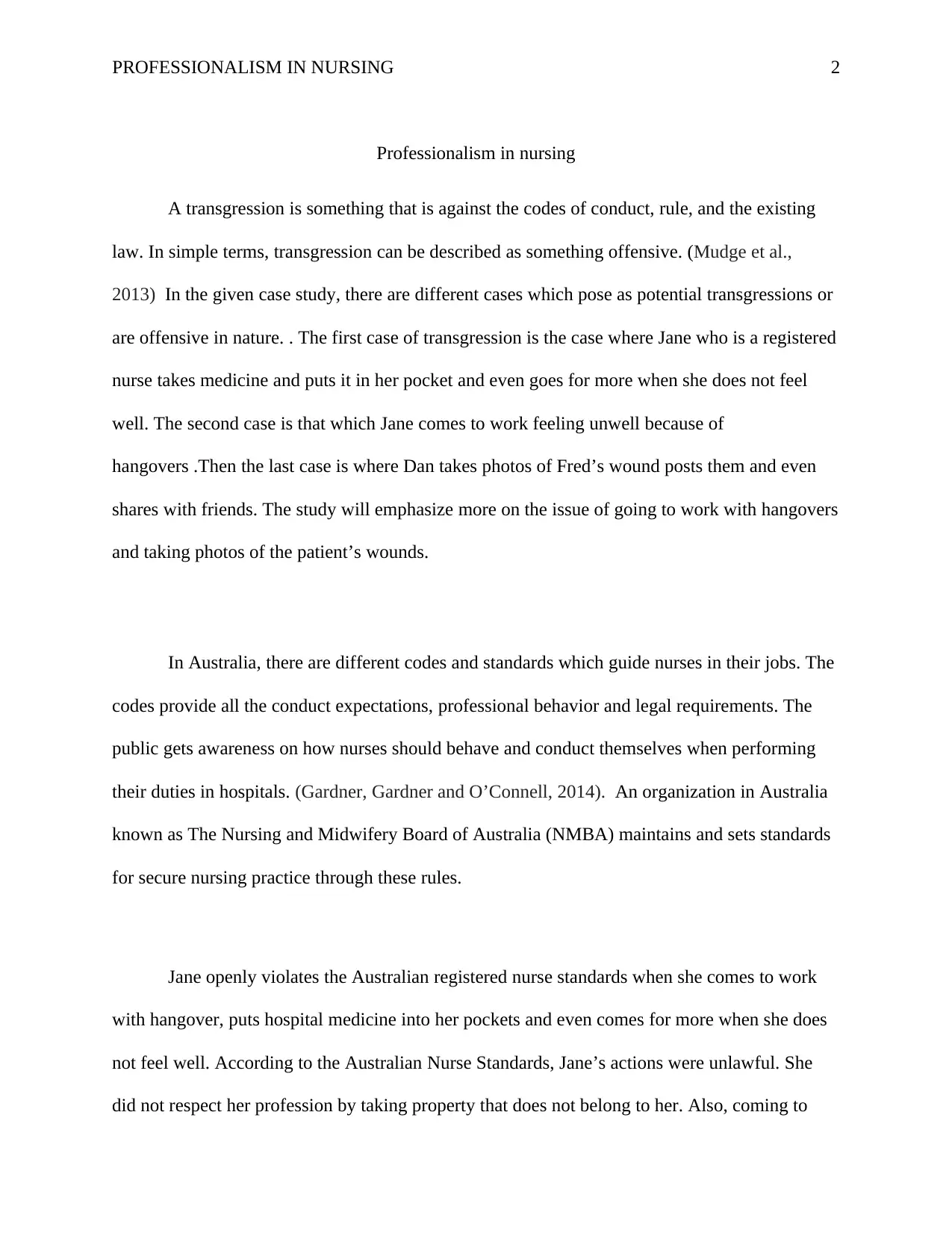
PROFESSIONALISM IN NURSING 2
Professionalism in nursing
A transgression is something that is against the codes of conduct, rule, and the existing
law. In simple terms, transgression can be described as something offensive. (Mudge et al.,
2013) In the given case study, there are different cases which pose as potential transgressions or
are offensive in nature. . The first case of transgression is the case where Jane who is a registered
nurse takes medicine and puts it in her pocket and even goes for more when she does not feel
well. The second case is that which Jane comes to work feeling unwell because of
hangovers .Then the last case is where Dan takes photos of Fred’s wound posts them and even
shares with friends. The study will emphasize more on the issue of going to work with hangovers
and taking photos of the patient’s wounds.
In Australia, there are different codes and standards which guide nurses in their jobs. The
codes provide all the conduct expectations, professional behavior and legal requirements. The
public gets awareness on how nurses should behave and conduct themselves when performing
their duties in hospitals. (Gardner, Gardner and O’Connell, 2014). An organization in Australia
known as The Nursing and Midwifery Board of Australia (NMBA) maintains and sets standards
for secure nursing practice through these rules.
Jane openly violates the Australian registered nurse standards when she comes to work
with hangover, puts hospital medicine into her pockets and even comes for more when she does
not feel well. According to the Australian Nurse Standards, Jane’s actions were unlawful. She
did not respect her profession by taking property that does not belong to her. Also, coming to
Professionalism in nursing
A transgression is something that is against the codes of conduct, rule, and the existing
law. In simple terms, transgression can be described as something offensive. (Mudge et al.,
2013) In the given case study, there are different cases which pose as potential transgressions or
are offensive in nature. . The first case of transgression is the case where Jane who is a registered
nurse takes medicine and puts it in her pocket and even goes for more when she does not feel
well. The second case is that which Jane comes to work feeling unwell because of
hangovers .Then the last case is where Dan takes photos of Fred’s wound posts them and even
shares with friends. The study will emphasize more on the issue of going to work with hangovers
and taking photos of the patient’s wounds.
In Australia, there are different codes and standards which guide nurses in their jobs. The
codes provide all the conduct expectations, professional behavior and legal requirements. The
public gets awareness on how nurses should behave and conduct themselves when performing
their duties in hospitals. (Gardner, Gardner and O’Connell, 2014). An organization in Australia
known as The Nursing and Midwifery Board of Australia (NMBA) maintains and sets standards
for secure nursing practice through these rules.
Jane openly violates the Australian registered nurse standards when she comes to work
with hangover, puts hospital medicine into her pockets and even comes for more when she does
not feel well. According to the Australian Nurse Standards, Jane’s actions were unlawful. She
did not respect her profession by taking property that does not belong to her. Also, coming to
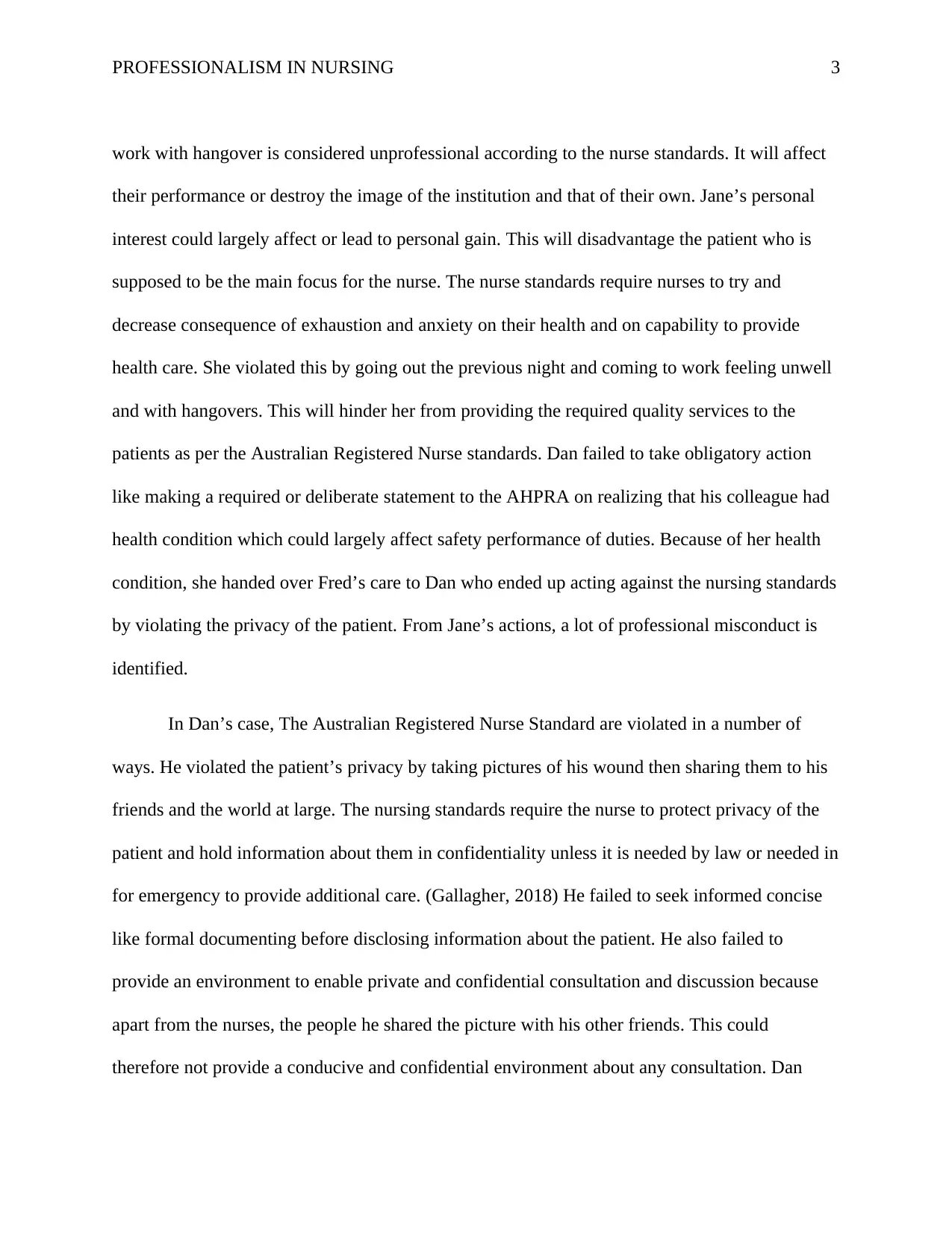
PROFESSIONALISM IN NURSING 3
work with hangover is considered unprofessional according to the nurse standards. It will affect
their performance or destroy the image of the institution and that of their own. Jane’s personal
interest could largely affect or lead to personal gain. This will disadvantage the patient who is
supposed to be the main focus for the nurse. The nurse standards require nurses to try and
decrease consequence of exhaustion and anxiety on their health and on capability to provide
health care. She violated this by going out the previous night and coming to work feeling unwell
and with hangovers. This will hinder her from providing the required quality services to the
patients as per the Australian Registered Nurse standards. Dan failed to take obligatory action
like making a required or deliberate statement to the AHPRA on realizing that his colleague had
health condition which could largely affect safety performance of duties. Because of her health
condition, she handed over Fred’s care to Dan who ended up acting against the nursing standards
by violating the privacy of the patient. From Jane’s actions, a lot of professional misconduct is
identified.
In Dan’s case, The Australian Registered Nurse Standard are violated in a number of
ways. He violated the patient’s privacy by taking pictures of his wound then sharing them to his
friends and the world at large. The nursing standards require the nurse to protect privacy of the
patient and hold information about them in confidentiality unless it is needed by law or needed in
for emergency to provide additional care. (Gallagher, 2018) He failed to seek informed concise
like formal documenting before disclosing information about the patient. He also failed to
provide an environment to enable private and confidential consultation and discussion because
apart from the nurses, the people he shared the picture with his other friends. This could
therefore not provide a conducive and confidential environment about any consultation. Dan
work with hangover is considered unprofessional according to the nurse standards. It will affect
their performance or destroy the image of the institution and that of their own. Jane’s personal
interest could largely affect or lead to personal gain. This will disadvantage the patient who is
supposed to be the main focus for the nurse. The nurse standards require nurses to try and
decrease consequence of exhaustion and anxiety on their health and on capability to provide
health care. She violated this by going out the previous night and coming to work feeling unwell
and with hangovers. This will hinder her from providing the required quality services to the
patients as per the Australian Registered Nurse standards. Dan failed to take obligatory action
like making a required or deliberate statement to the AHPRA on realizing that his colleague had
health condition which could largely affect safety performance of duties. Because of her health
condition, she handed over Fred’s care to Dan who ended up acting against the nursing standards
by violating the privacy of the patient. From Jane’s actions, a lot of professional misconduct is
identified.
In Dan’s case, The Australian Registered Nurse Standard are violated in a number of
ways. He violated the patient’s privacy by taking pictures of his wound then sharing them to his
friends and the world at large. The nursing standards require the nurse to protect privacy of the
patient and hold information about them in confidentiality unless it is needed by law or needed in
for emergency to provide additional care. (Gallagher, 2018) He failed to seek informed concise
like formal documenting before disclosing information about the patient. He also failed to
provide an environment to enable private and confidential consultation and discussion because
apart from the nurses, the people he shared the picture with his other friends. This could
therefore not provide a conducive and confidential environment about any consultation. Dan
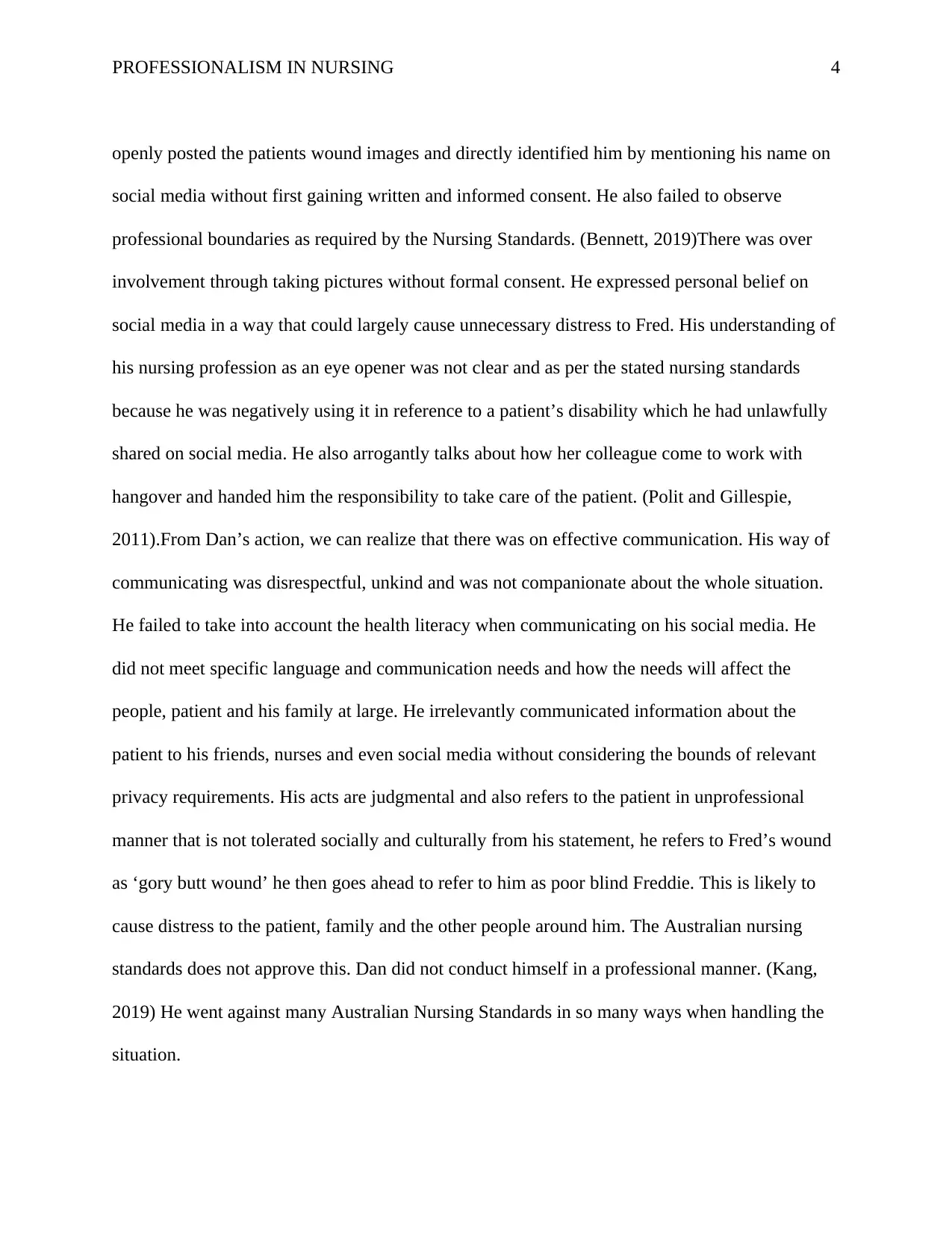
PROFESSIONALISM IN NURSING 4
openly posted the patients wound images and directly identified him by mentioning his name on
social media without first gaining written and informed consent. He also failed to observe
professional boundaries as required by the Nursing Standards. (Bennett, 2019)There was over
involvement through taking pictures without formal consent. He expressed personal belief on
social media in a way that could largely cause unnecessary distress to Fred. His understanding of
his nursing profession as an eye opener was not clear and as per the stated nursing standards
because he was negatively using it in reference to a patient’s disability which he had unlawfully
shared on social media. He also arrogantly talks about how her colleague come to work with
hangover and handed him the responsibility to take care of the patient. (Polit and Gillespie,
2011).From Dan’s action, we can realize that there was on effective communication. His way of
communicating was disrespectful, unkind and was not companionate about the whole situation.
He failed to take into account the health literacy when communicating on his social media. He
did not meet specific language and communication needs and how the needs will affect the
people, patient and his family at large. He irrelevantly communicated information about the
patient to his friends, nurses and even social media without considering the bounds of relevant
privacy requirements. His acts are judgmental and also refers to the patient in unprofessional
manner that is not tolerated socially and culturally from his statement, he refers to Fred’s wound
as ‘gory butt wound’ he then goes ahead to refer to him as poor blind Freddie. This is likely to
cause distress to the patient, family and the other people around him. The Australian nursing
standards does not approve this. Dan did not conduct himself in a professional manner. (Kang,
2019) He went against many Australian Nursing Standards in so many ways when handling the
situation.
openly posted the patients wound images and directly identified him by mentioning his name on
social media without first gaining written and informed consent. He also failed to observe
professional boundaries as required by the Nursing Standards. (Bennett, 2019)There was over
involvement through taking pictures without formal consent. He expressed personal belief on
social media in a way that could largely cause unnecessary distress to Fred. His understanding of
his nursing profession as an eye opener was not clear and as per the stated nursing standards
because he was negatively using it in reference to a patient’s disability which he had unlawfully
shared on social media. He also arrogantly talks about how her colleague come to work with
hangover and handed him the responsibility to take care of the patient. (Polit and Gillespie,
2011).From Dan’s action, we can realize that there was on effective communication. His way of
communicating was disrespectful, unkind and was not companionate about the whole situation.
He failed to take into account the health literacy when communicating on his social media. He
did not meet specific language and communication needs and how the needs will affect the
people, patient and his family at large. He irrelevantly communicated information about the
patient to his friends, nurses and even social media without considering the bounds of relevant
privacy requirements. His acts are judgmental and also refers to the patient in unprofessional
manner that is not tolerated socially and culturally from his statement, he refers to Fred’s wound
as ‘gory butt wound’ he then goes ahead to refer to him as poor blind Freddie. This is likely to
cause distress to the patient, family and the other people around him. The Australian nursing
standards does not approve this. Dan did not conduct himself in a professional manner. (Kang,
2019) He went against many Australian Nursing Standards in so many ways when handling the
situation.
Secure Best Marks with AI Grader
Need help grading? Try our AI Grader for instant feedback on your assignments.
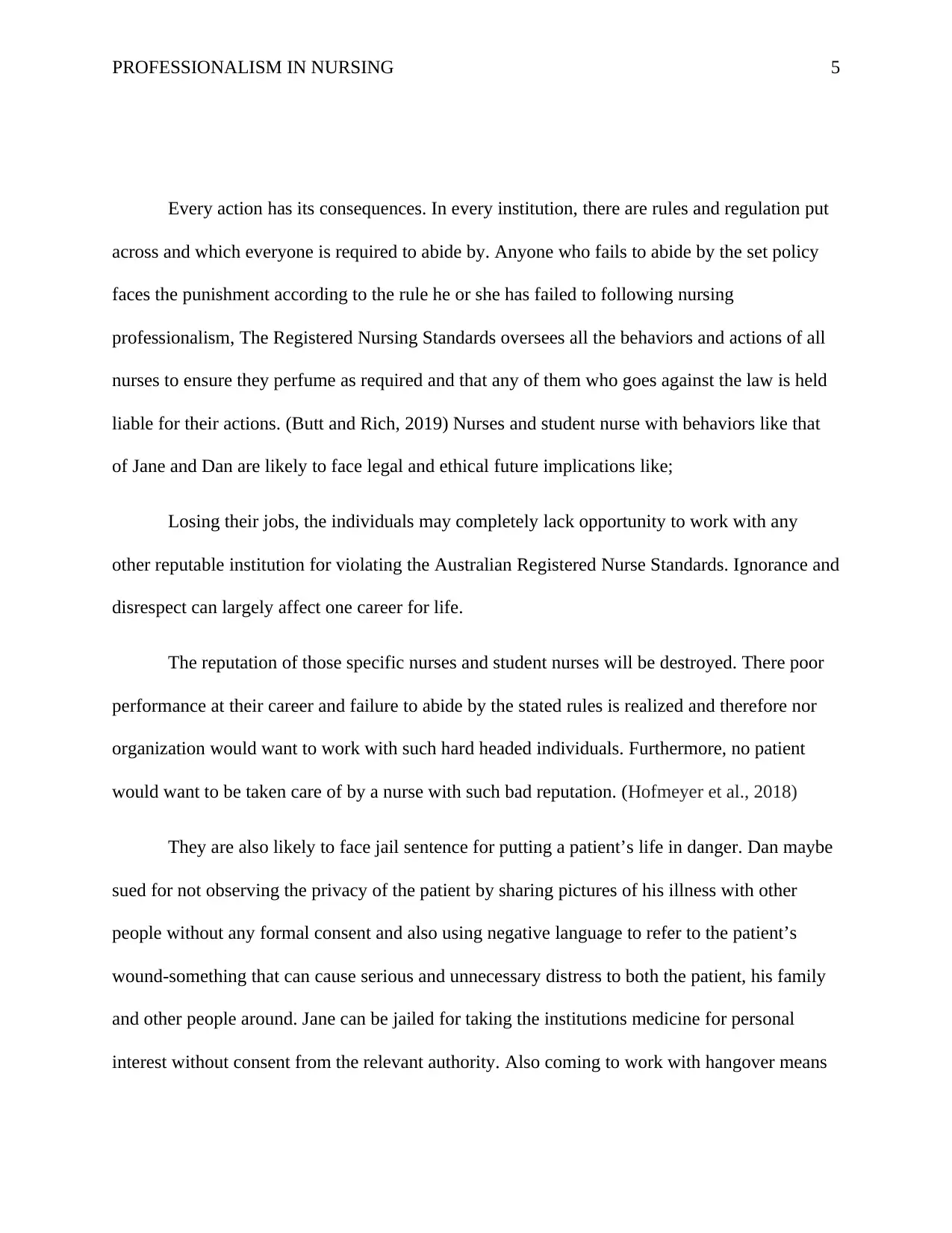
PROFESSIONALISM IN NURSING 5
Every action has its consequences. In every institution, there are rules and regulation put
across and which everyone is required to abide by. Anyone who fails to abide by the set policy
faces the punishment according to the rule he or she has failed to following nursing
professionalism, The Registered Nursing Standards oversees all the behaviors and actions of all
nurses to ensure they perfume as required and that any of them who goes against the law is held
liable for their actions. (Butt and Rich, 2019) Nurses and student nurse with behaviors like that
of Jane and Dan are likely to face legal and ethical future implications like;
Losing their jobs, the individuals may completely lack opportunity to work with any
other reputable institution for violating the Australian Registered Nurse Standards. Ignorance and
disrespect can largely affect one career for life.
The reputation of those specific nurses and student nurses will be destroyed. There poor
performance at their career and failure to abide by the stated rules is realized and therefore nor
organization would want to work with such hard headed individuals. Furthermore, no patient
would want to be taken care of by a nurse with such bad reputation. (Hofmeyer et al., 2018)
They are also likely to face jail sentence for putting a patient’s life in danger. Dan maybe
sued for not observing the privacy of the patient by sharing pictures of his illness with other
people without any formal consent and also using negative language to refer to the patient’s
wound-something that can cause serious and unnecessary distress to both the patient, his family
and other people around. Jane can be jailed for taking the institutions medicine for personal
interest without consent from the relevant authority. Also coming to work with hangover means
Every action has its consequences. In every institution, there are rules and regulation put
across and which everyone is required to abide by. Anyone who fails to abide by the set policy
faces the punishment according to the rule he or she has failed to following nursing
professionalism, The Registered Nursing Standards oversees all the behaviors and actions of all
nurses to ensure they perfume as required and that any of them who goes against the law is held
liable for their actions. (Butt and Rich, 2019) Nurses and student nurse with behaviors like that
of Jane and Dan are likely to face legal and ethical future implications like;
Losing their jobs, the individuals may completely lack opportunity to work with any
other reputable institution for violating the Australian Registered Nurse Standards. Ignorance and
disrespect can largely affect one career for life.
The reputation of those specific nurses and student nurses will be destroyed. There poor
performance at their career and failure to abide by the stated rules is realized and therefore nor
organization would want to work with such hard headed individuals. Furthermore, no patient
would want to be taken care of by a nurse with such bad reputation. (Hofmeyer et al., 2018)
They are also likely to face jail sentence for putting a patient’s life in danger. Dan maybe
sued for not observing the privacy of the patient by sharing pictures of his illness with other
people without any formal consent and also using negative language to refer to the patient’s
wound-something that can cause serious and unnecessary distress to both the patient, his family
and other people around. Jane can be jailed for taking the institutions medicine for personal
interest without consent from the relevant authority. Also coming to work with hangover means
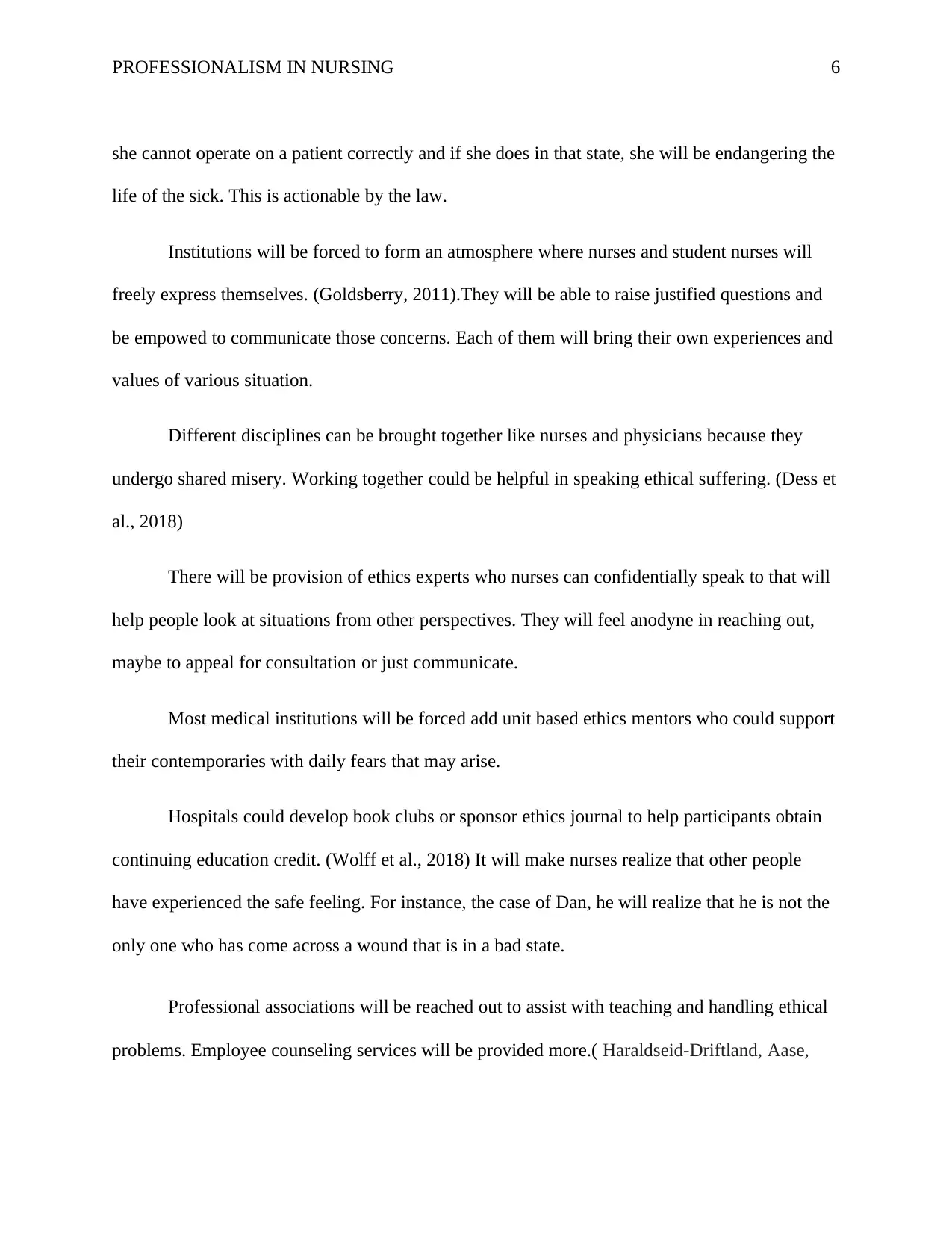
PROFESSIONALISM IN NURSING 6
she cannot operate on a patient correctly and if she does in that state, she will be endangering the
life of the sick. This is actionable by the law.
Institutions will be forced to form an atmosphere where nurses and student nurses will
freely express themselves. (Goldsberry, 2011).They will be able to raise justified questions and
be empowed to communicate those concerns. Each of them will bring their own experiences and
values of various situation.
Different disciplines can be brought together like nurses and physicians because they
undergo shared misery. Working together could be helpful in speaking ethical suffering. (Dess et
al., 2018)
There will be provision of ethics experts who nurses can confidentially speak to that will
help people look at situations from other perspectives. They will feel anodyne in reaching out,
maybe to appeal for consultation or just communicate.
Most medical institutions will be forced add unit based ethics mentors who could support
their contemporaries with daily fears that may arise.
Hospitals could develop book clubs or sponsor ethics journal to help participants obtain
continuing education credit. (Wolff et al., 2018) It will make nurses realize that other people
have experienced the safe feeling. For instance, the case of Dan, he will realize that he is not the
only one who has come across a wound that is in a bad state.
Professional associations will be reached out to assist with teaching and handling ethical
problems. Employee counseling services will be provided more.( Haraldseid-Driftland, Aase,
she cannot operate on a patient correctly and if she does in that state, she will be endangering the
life of the sick. This is actionable by the law.
Institutions will be forced to form an atmosphere where nurses and student nurses will
freely express themselves. (Goldsberry, 2011).They will be able to raise justified questions and
be empowed to communicate those concerns. Each of them will bring their own experiences and
values of various situation.
Different disciplines can be brought together like nurses and physicians because they
undergo shared misery. Working together could be helpful in speaking ethical suffering. (Dess et
al., 2018)
There will be provision of ethics experts who nurses can confidentially speak to that will
help people look at situations from other perspectives. They will feel anodyne in reaching out,
maybe to appeal for consultation or just communicate.
Most medical institutions will be forced add unit based ethics mentors who could support
their contemporaries with daily fears that may arise.
Hospitals could develop book clubs or sponsor ethics journal to help participants obtain
continuing education credit. (Wolff et al., 2018) It will make nurses realize that other people
have experienced the safe feeling. For instance, the case of Dan, he will realize that he is not the
only one who has come across a wound that is in a bad state.
Professional associations will be reached out to assist with teaching and handling ethical
problems. Employee counseling services will be provided more.( Haraldseid-Driftland, Aase,
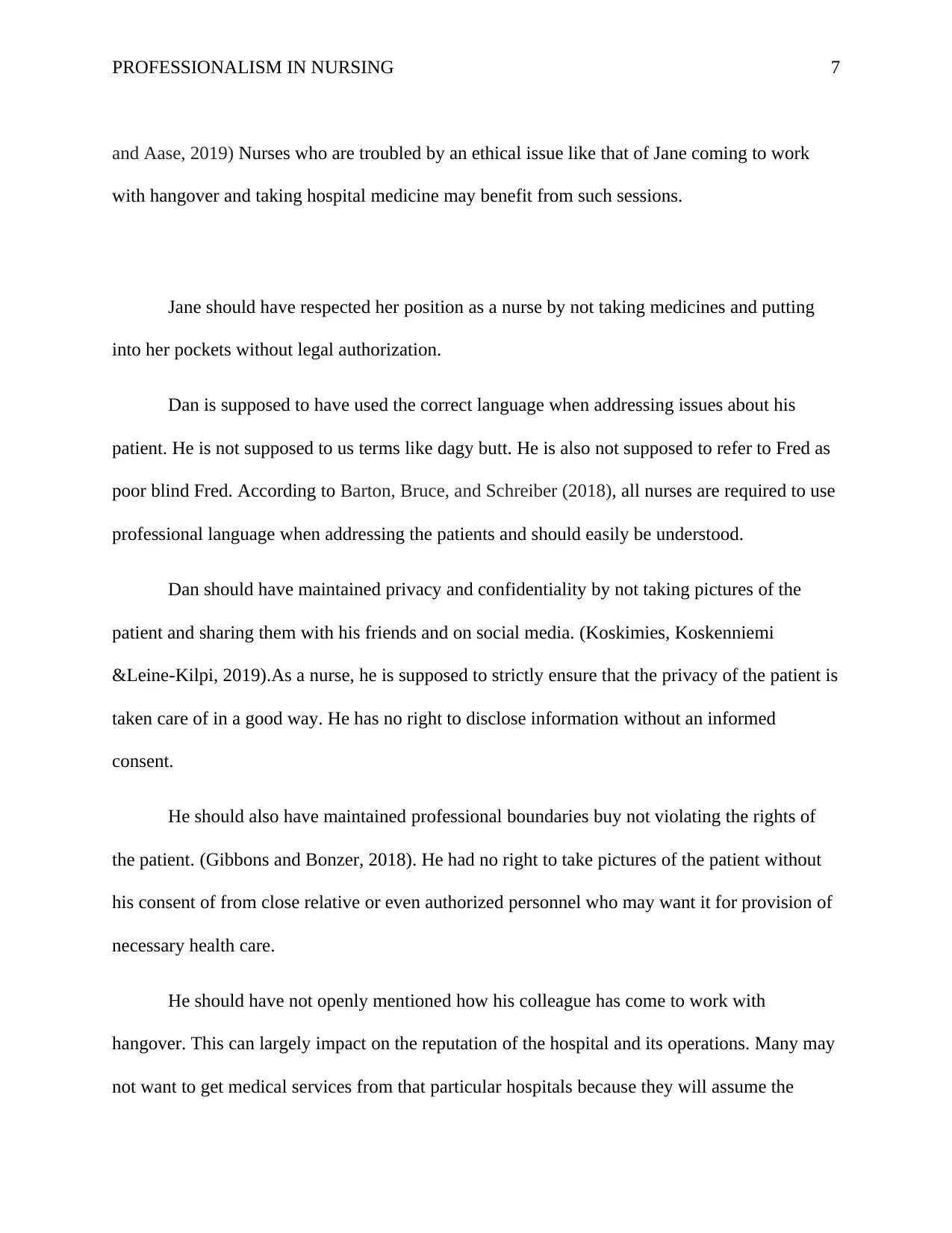
PROFESSIONALISM IN NURSING 7
and Aase, 2019) Nurses who are troubled by an ethical issue like that of Jane coming to work
with hangover and taking hospital medicine may benefit from such sessions.
Jane should have respected her position as a nurse by not taking medicines and putting
into her pockets without legal authorization.
Dan is supposed to have used the correct language when addressing issues about his
patient. He is not supposed to us terms like dagy butt. He is also not supposed to refer to Fred as
poor blind Fred. According to Barton, Bruce, and Schreiber (2018), all nurses are required to use
professional language when addressing the patients and should easily be understood.
Dan should have maintained privacy and confidentiality by not taking pictures of the
patient and sharing them with his friends and on social media. (Koskimies, Koskenniemi
&Leine-Kilpi, 2019).As a nurse, he is supposed to strictly ensure that the privacy of the patient is
taken care of in a good way. He has no right to disclose information without an informed
consent.
He should also have maintained professional boundaries buy not violating the rights of
the patient. (Gibbons and Bonzer, 2018). He had no right to take pictures of the patient without
his consent of from close relative or even authorized personnel who may want it for provision of
necessary health care.
He should have not openly mentioned how his colleague has come to work with
hangover. This can largely impact on the reputation of the hospital and its operations. Many may
not want to get medical services from that particular hospitals because they will assume the
and Aase, 2019) Nurses who are troubled by an ethical issue like that of Jane coming to work
with hangover and taking hospital medicine may benefit from such sessions.
Jane should have respected her position as a nurse by not taking medicines and putting
into her pockets without legal authorization.
Dan is supposed to have used the correct language when addressing issues about his
patient. He is not supposed to us terms like dagy butt. He is also not supposed to refer to Fred as
poor blind Fred. According to Barton, Bruce, and Schreiber (2018), all nurses are required to use
professional language when addressing the patients and should easily be understood.
Dan should have maintained privacy and confidentiality by not taking pictures of the
patient and sharing them with his friends and on social media. (Koskimies, Koskenniemi
&Leine-Kilpi, 2019).As a nurse, he is supposed to strictly ensure that the privacy of the patient is
taken care of in a good way. He has no right to disclose information without an informed
consent.
He should also have maintained professional boundaries buy not violating the rights of
the patient. (Gibbons and Bonzer, 2018). He had no right to take pictures of the patient without
his consent of from close relative or even authorized personnel who may want it for provision of
necessary health care.
He should have not openly mentioned how his colleague has come to work with
hangover. This can largely impact on the reputation of the hospital and its operations. Many may
not want to get medical services from that particular hospitals because they will assume the
Paraphrase This Document
Need a fresh take? Get an instant paraphrase of this document with our AI Paraphraser
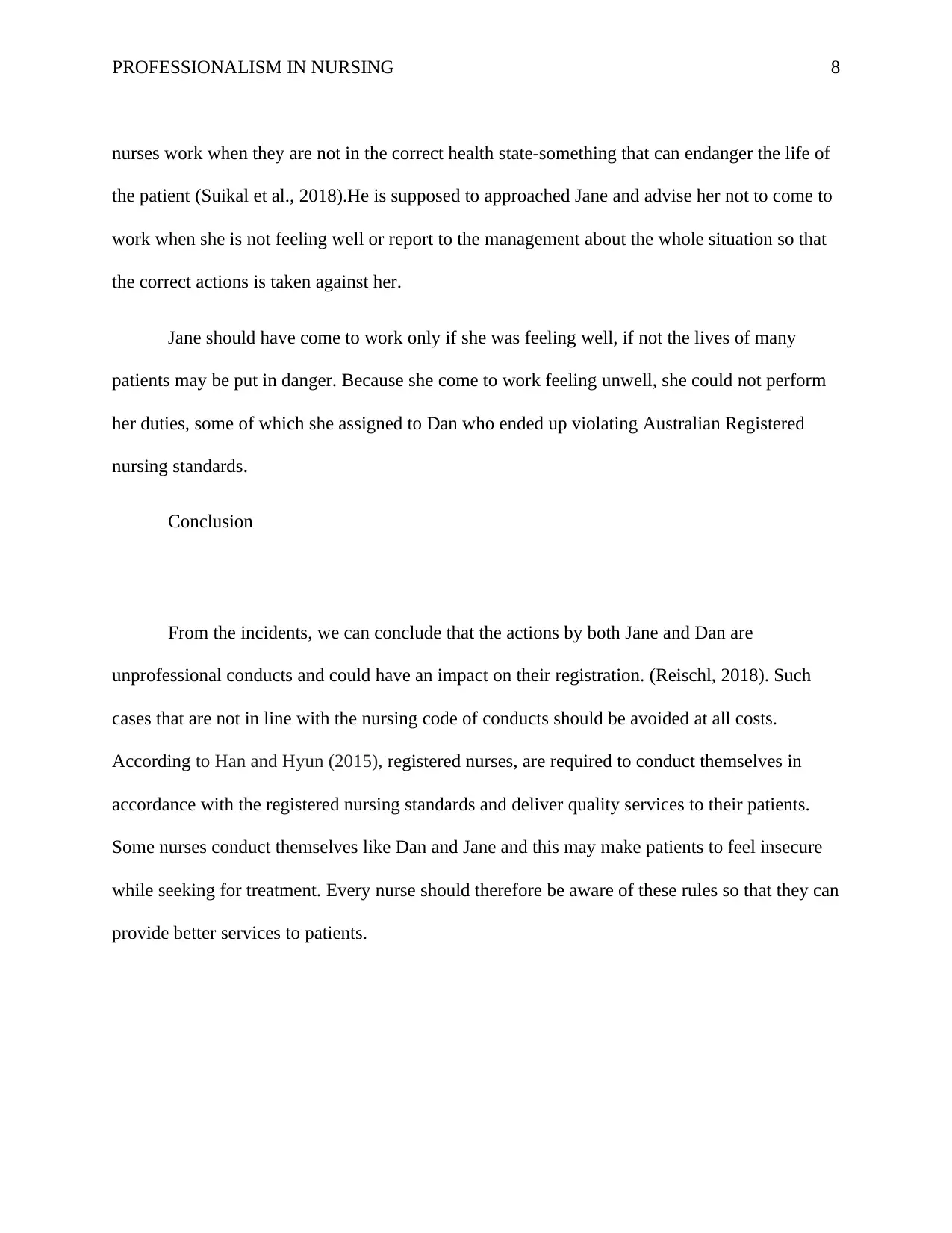
PROFESSIONALISM IN NURSING 8
nurses work when they are not in the correct health state-something that can endanger the life of
the patient (Suikal et al., 2018).He is supposed to approached Jane and advise her not to come to
work when she is not feeling well or report to the management about the whole situation so that
the correct actions is taken against her.
Jane should have come to work only if she was feeling well, if not the lives of many
patients may be put in danger. Because she come to work feeling unwell, she could not perform
her duties, some of which she assigned to Dan who ended up violating Australian Registered
nursing standards.
Conclusion
From the incidents, we can conclude that the actions by both Jane and Dan are
unprofessional conducts and could have an impact on their registration. (Reischl, 2018). Such
cases that are not in line with the nursing code of conducts should be avoided at all costs.
According to Han and Hyun (2015), registered nurses, are required to conduct themselves in
accordance with the registered nursing standards and deliver quality services to their patients.
Some nurses conduct themselves like Dan and Jane and this may make patients to feel insecure
while seeking for treatment. Every nurse should therefore be aware of these rules so that they can
provide better services to patients.
nurses work when they are not in the correct health state-something that can endanger the life of
the patient (Suikal et al., 2018).He is supposed to approached Jane and advise her not to come to
work when she is not feeling well or report to the management about the whole situation so that
the correct actions is taken against her.
Jane should have come to work only if she was feeling well, if not the lives of many
patients may be put in danger. Because she come to work feeling unwell, she could not perform
her duties, some of which she assigned to Dan who ended up violating Australian Registered
nursing standards.
Conclusion
From the incidents, we can conclude that the actions by both Jane and Dan are
unprofessional conducts and could have an impact on their registration. (Reischl, 2018). Such
cases that are not in line with the nursing code of conducts should be avoided at all costs.
According to Han and Hyun (2015), registered nurses, are required to conduct themselves in
accordance with the registered nursing standards and deliver quality services to their patients.
Some nurses conduct themselves like Dan and Jane and this may make patients to feel insecure
while seeking for treatment. Every nurse should therefore be aware of these rules so that they can
provide better services to patients.
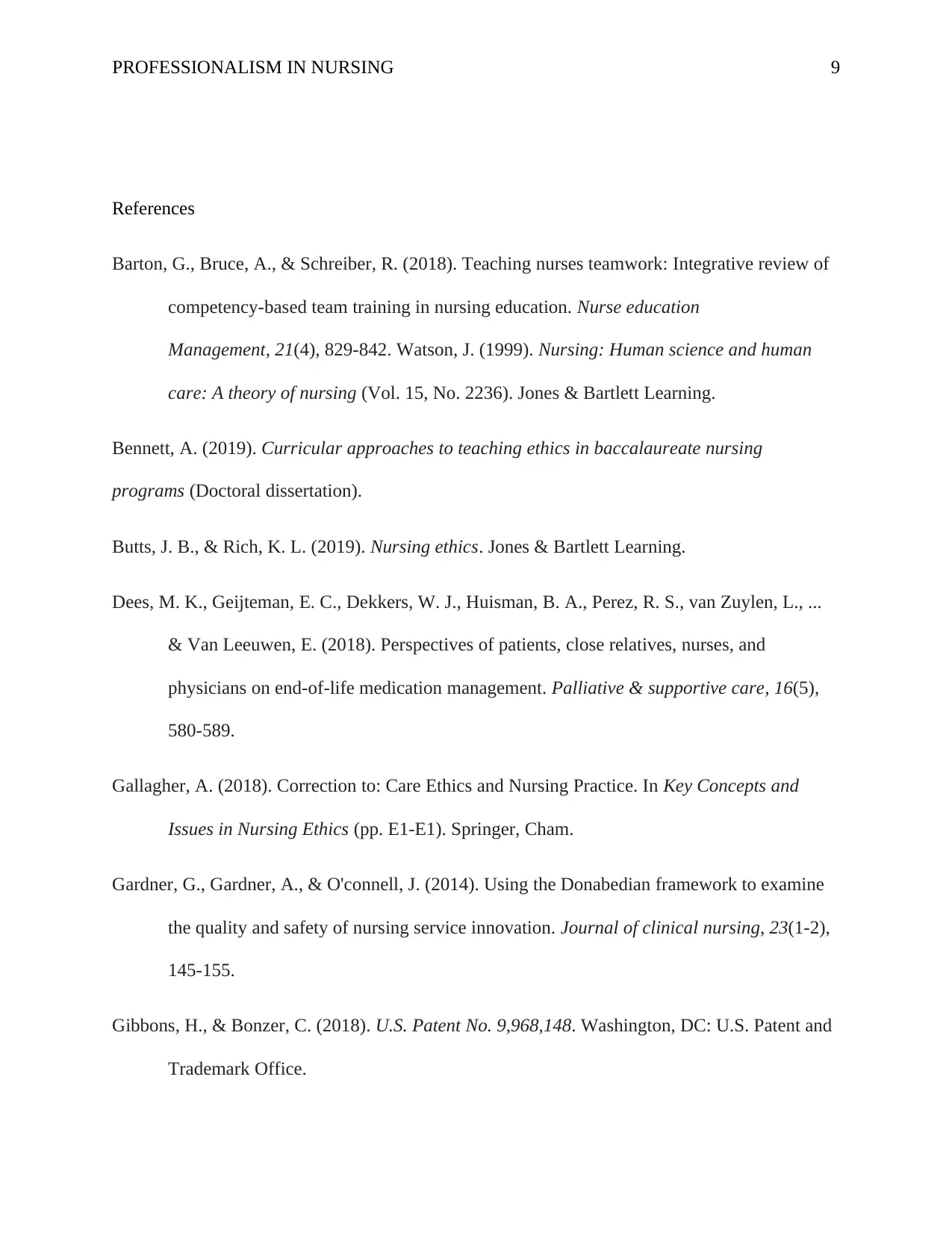
PROFESSIONALISM IN NURSING 9
References
Barton, G., Bruce, A., & Schreiber, R. (2018). Teaching nurses teamwork: Integrative review of
competency-based team training in nursing education. Nurse education
Management, 21(4), 829-842. Watson, J. (1999). Nursing: Human science and human
care: A theory of nursing (Vol. 15, No. 2236). Jones & Bartlett Learning.
Bennett, A. (2019). Curricular approaches to teaching ethics in baccalaureate nursing
programs (Doctoral dissertation).
Butts, J. B., & Rich, K. L. (2019). Nursing ethics. Jones & Bartlett Learning.
Dees, M. K., Geijteman, E. C., Dekkers, W. J., Huisman, B. A., Perez, R. S., van Zuylen, L., ...
& Van Leeuwen, E. (2018). Perspectives of patients, close relatives, nurses, and
physicians on end-of-life medication management. Palliative & supportive care, 16(5),
580-589.
Gallagher, A. (2018). Correction to: Care Ethics and Nursing Practice. In Key Concepts and
Issues in Nursing Ethics (pp. E1-E1). Springer, Cham.
Gardner, G., Gardner, A., & O'connell, J. (2014). Using the Donabedian framework to examine
the quality and safety of nursing service innovation. Journal of clinical nursing, 23(1-2),
145-155.
Gibbons, H., & Bonzer, C. (2018). U.S. Patent No. 9,968,148. Washington, DC: U.S. Patent and
Trademark Office.
References
Barton, G., Bruce, A., & Schreiber, R. (2018). Teaching nurses teamwork: Integrative review of
competency-based team training in nursing education. Nurse education
Management, 21(4), 829-842. Watson, J. (1999). Nursing: Human science and human
care: A theory of nursing (Vol. 15, No. 2236). Jones & Bartlett Learning.
Bennett, A. (2019). Curricular approaches to teaching ethics in baccalaureate nursing
programs (Doctoral dissertation).
Butts, J. B., & Rich, K. L. (2019). Nursing ethics. Jones & Bartlett Learning.
Dees, M. K., Geijteman, E. C., Dekkers, W. J., Huisman, B. A., Perez, R. S., van Zuylen, L., ...
& Van Leeuwen, E. (2018). Perspectives of patients, close relatives, nurses, and
physicians on end-of-life medication management. Palliative & supportive care, 16(5),
580-589.
Gallagher, A. (2018). Correction to: Care Ethics and Nursing Practice. In Key Concepts and
Issues in Nursing Ethics (pp. E1-E1). Springer, Cham.
Gardner, G., Gardner, A., & O'connell, J. (2014). Using the Donabedian framework to examine
the quality and safety of nursing service innovation. Journal of clinical nursing, 23(1-2),
145-155.
Gibbons, H., & Bonzer, C. (2018). U.S. Patent No. 9,968,148. Washington, DC: U.S. Patent and
Trademark Office.
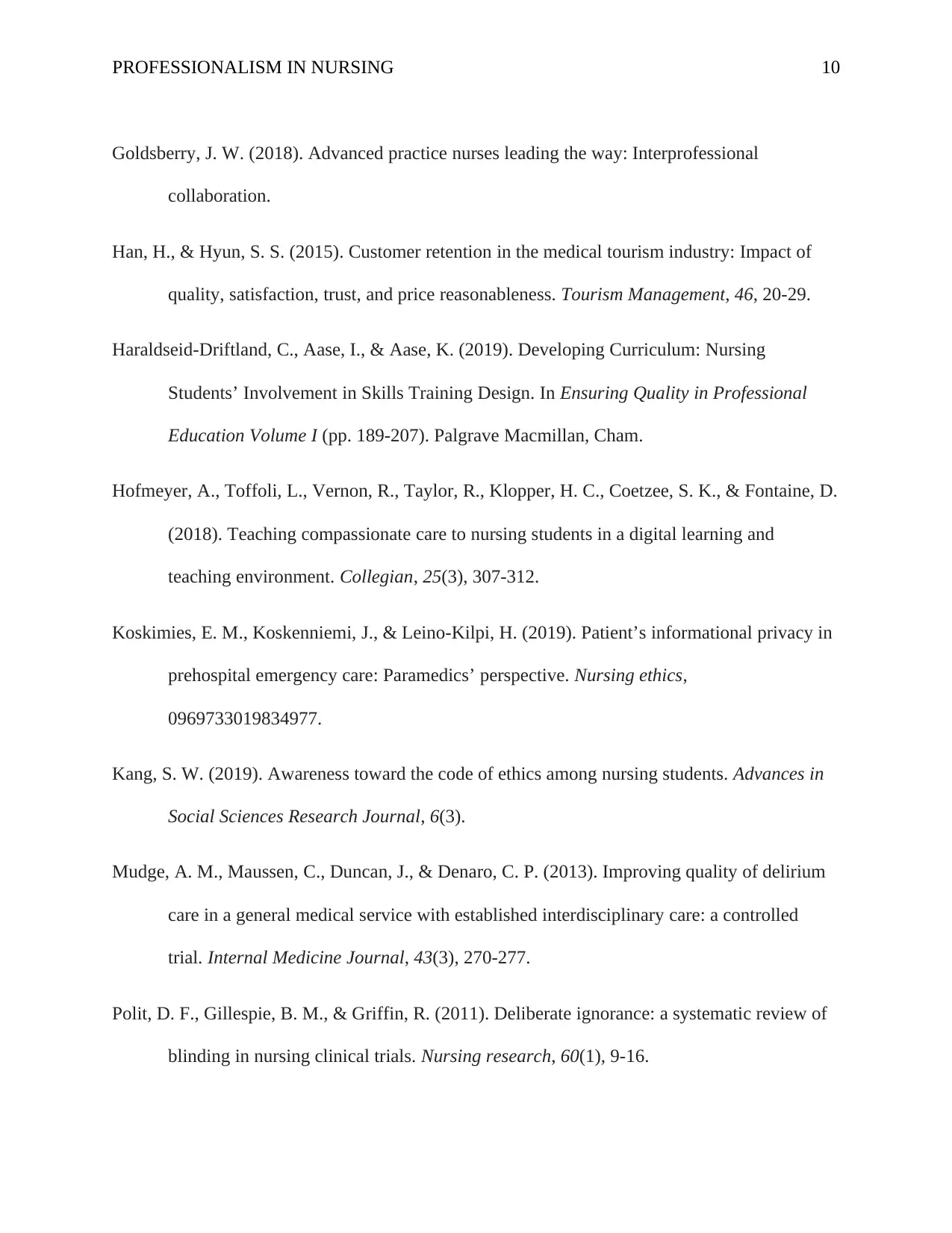
PROFESSIONALISM IN NURSING 10
Goldsberry, J. W. (2018). Advanced practice nurses leading the way: Interprofessional
collaboration.
Han, H., & Hyun, S. S. (2015). Customer retention in the medical tourism industry: Impact of
quality, satisfaction, trust, and price reasonableness. Tourism Management, 46, 20-29.
Haraldseid-Driftland, C., Aase, I., & Aase, K. (2019). Developing Curriculum: Nursing
Students’ Involvement in Skills Training Design. In Ensuring Quality in Professional
Education Volume I (pp. 189-207). Palgrave Macmillan, Cham.
Hofmeyer, A., Toffoli, L., Vernon, R., Taylor, R., Klopper, H. C., Coetzee, S. K., & Fontaine, D.
(2018). Teaching compassionate care to nursing students in a digital learning and
teaching environment. Collegian, 25(3), 307-312.
Koskimies, E. M., Koskenniemi, J., & Leino-Kilpi, H. (2019). Patient’s informational privacy in
prehospital emergency care: Paramedics’ perspective. Nursing ethics,
0969733019834977.
Kang, S. W. (2019). Awareness toward the code of ethics among nursing students. Advances in
Social Sciences Research Journal, 6(3).
Mudge, A. M., Maussen, C., Duncan, J., & Denaro, C. P. (2013). Improving quality of delirium
care in a general medical service with established interdisciplinary care: a controlled
trial. Internal Medicine Journal, 43(3), 270-277.
Polit, D. F., Gillespie, B. M., & Griffin, R. (2011). Deliberate ignorance: a systematic review of
blinding in nursing clinical trials. Nursing research, 60(1), 9-16.
Goldsberry, J. W. (2018). Advanced practice nurses leading the way: Interprofessional
collaboration.
Han, H., & Hyun, S. S. (2015). Customer retention in the medical tourism industry: Impact of
quality, satisfaction, trust, and price reasonableness. Tourism Management, 46, 20-29.
Haraldseid-Driftland, C., Aase, I., & Aase, K. (2019). Developing Curriculum: Nursing
Students’ Involvement in Skills Training Design. In Ensuring Quality in Professional
Education Volume I (pp. 189-207). Palgrave Macmillan, Cham.
Hofmeyer, A., Toffoli, L., Vernon, R., Taylor, R., Klopper, H. C., Coetzee, S. K., & Fontaine, D.
(2018). Teaching compassionate care to nursing students in a digital learning and
teaching environment. Collegian, 25(3), 307-312.
Koskimies, E. M., Koskenniemi, J., & Leino-Kilpi, H. (2019). Patient’s informational privacy in
prehospital emergency care: Paramedics’ perspective. Nursing ethics,
0969733019834977.
Kang, S. W. (2019). Awareness toward the code of ethics among nursing students. Advances in
Social Sciences Research Journal, 6(3).
Mudge, A. M., Maussen, C., Duncan, J., & Denaro, C. P. (2013). Improving quality of delirium
care in a general medical service with established interdisciplinary care: a controlled
trial. Internal Medicine Journal, 43(3), 270-277.
Polit, D. F., Gillespie, B. M., & Griffin, R. (2011). Deliberate ignorance: a systematic review of
blinding in nursing clinical trials. Nursing research, 60(1), 9-16.
Secure Best Marks with AI Grader
Need help grading? Try our AI Grader for instant feedback on your assignments.
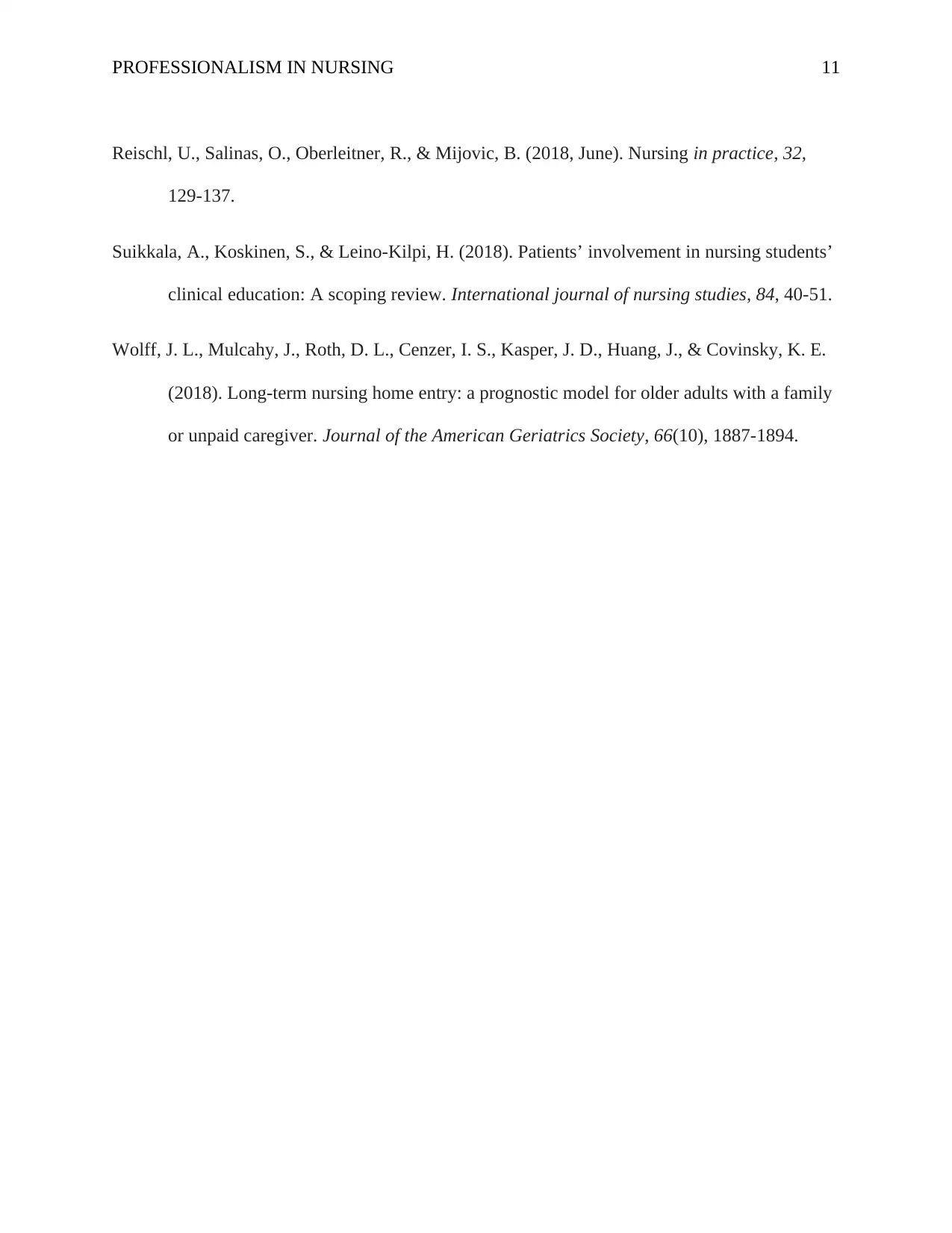
PROFESSIONALISM IN NURSING 11
Reischl, U., Salinas, O., Oberleitner, R., & Mijovic, B. (2018, June). Nursing in practice, 32,
129-137.
Suikkala, A., Koskinen, S., & Leino-Kilpi, H. (2018). Patients’ involvement in nursing students’
clinical education: A scoping review. International journal of nursing studies, 84, 40-51.
Wolff, J. L., Mulcahy, J., Roth, D. L., Cenzer, I. S., Kasper, J. D., Huang, J., & Covinsky, K. E.
(2018). Long‐term nursing home entry: a prognostic model for older adults with a family
or unpaid caregiver. Journal of the American Geriatrics Society, 66(10), 1887-1894.
Reischl, U., Salinas, O., Oberleitner, R., & Mijovic, B. (2018, June). Nursing in practice, 32,
129-137.
Suikkala, A., Koskinen, S., & Leino-Kilpi, H. (2018). Patients’ involvement in nursing students’
clinical education: A scoping review. International journal of nursing studies, 84, 40-51.
Wolff, J. L., Mulcahy, J., Roth, D. L., Cenzer, I. S., Kasper, J. D., Huang, J., & Covinsky, K. E.
(2018). Long‐term nursing home entry: a prognostic model for older adults with a family
or unpaid caregiver. Journal of the American Geriatrics Society, 66(10), 1887-1894.
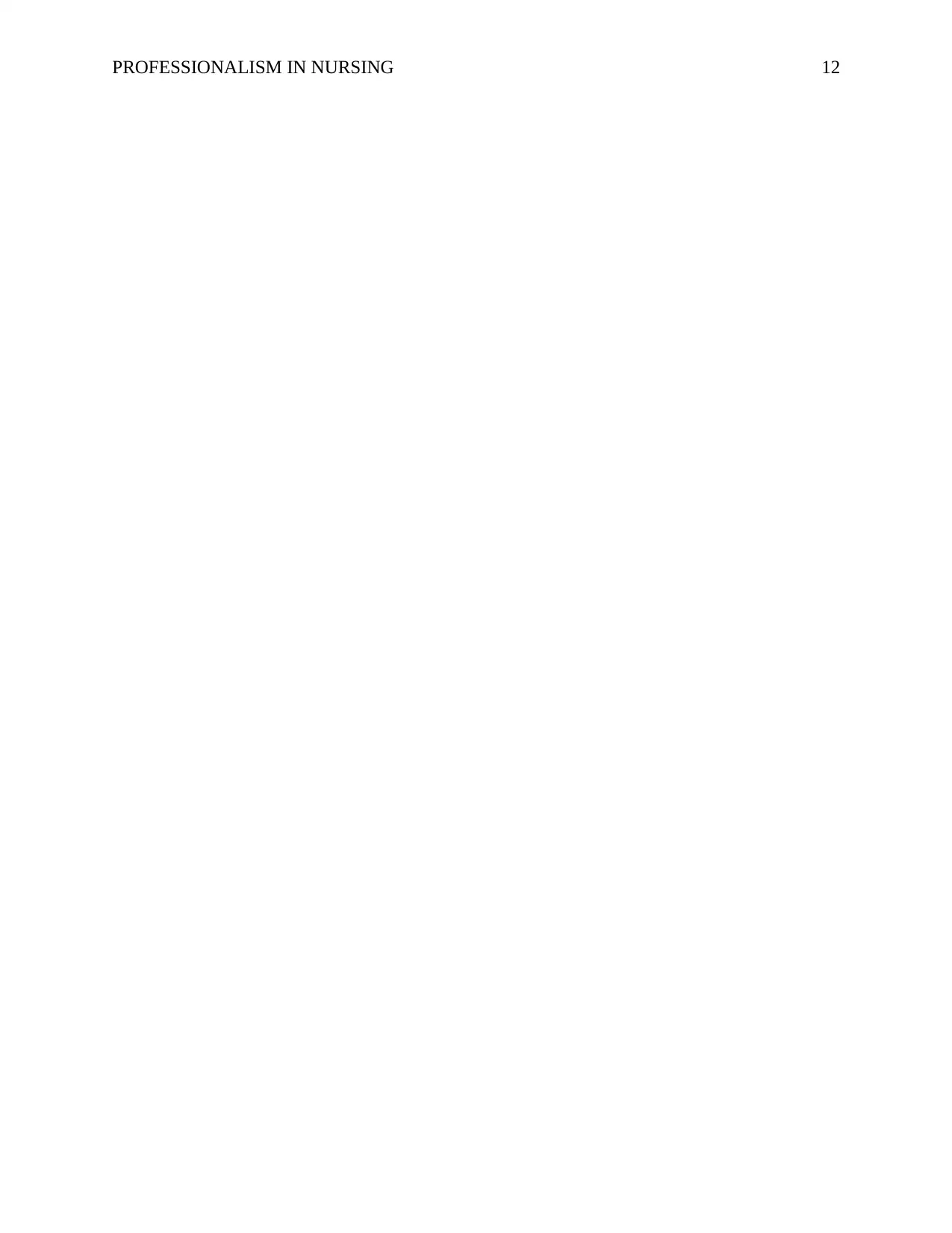
PROFESSIONALISM IN NURSING 12
1 out of 12
Related Documents
Your All-in-One AI-Powered Toolkit for Academic Success.
+13062052269
info@desklib.com
Available 24*7 on WhatsApp / Email
![[object Object]](/_next/static/media/star-bottom.7253800d.svg)
Unlock your academic potential
© 2024 | Zucol Services PVT LTD | All rights reserved.





